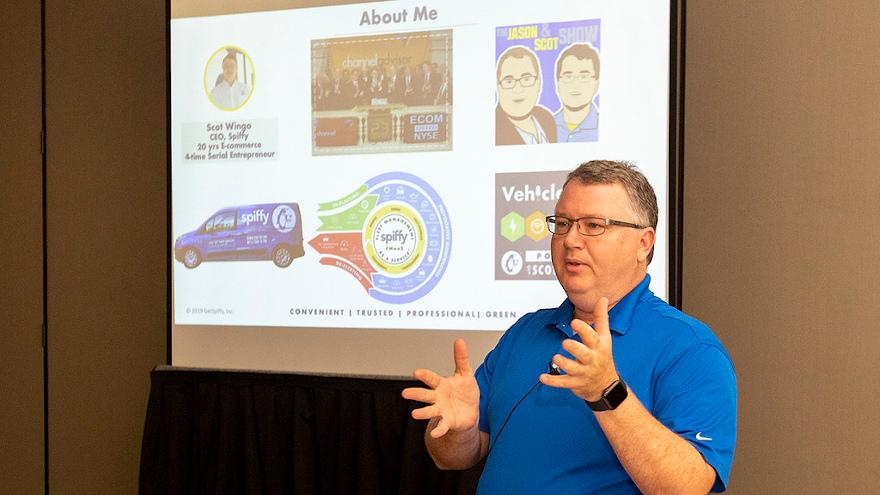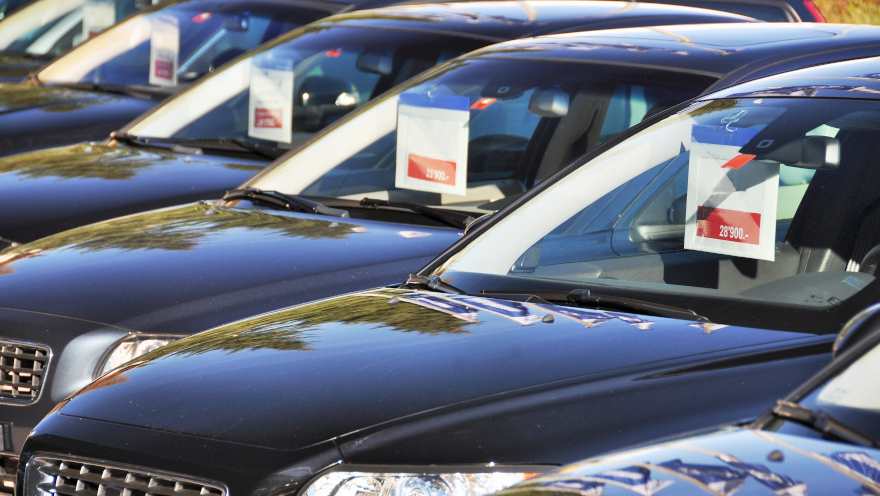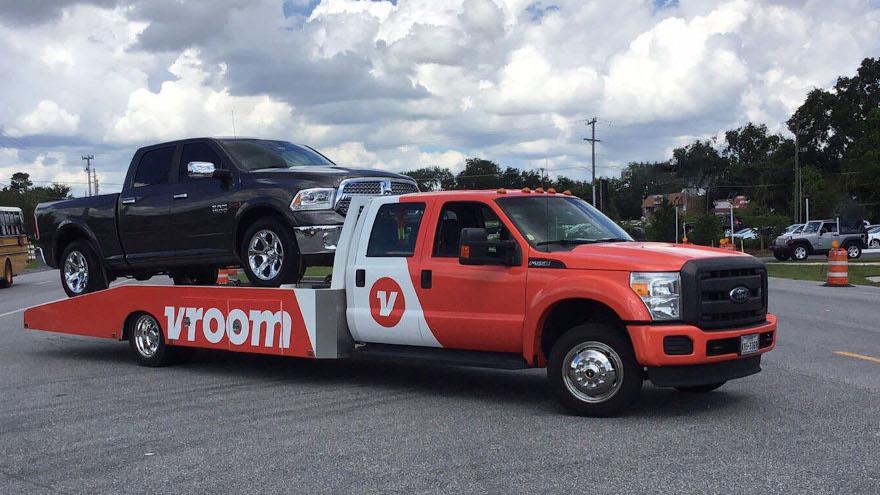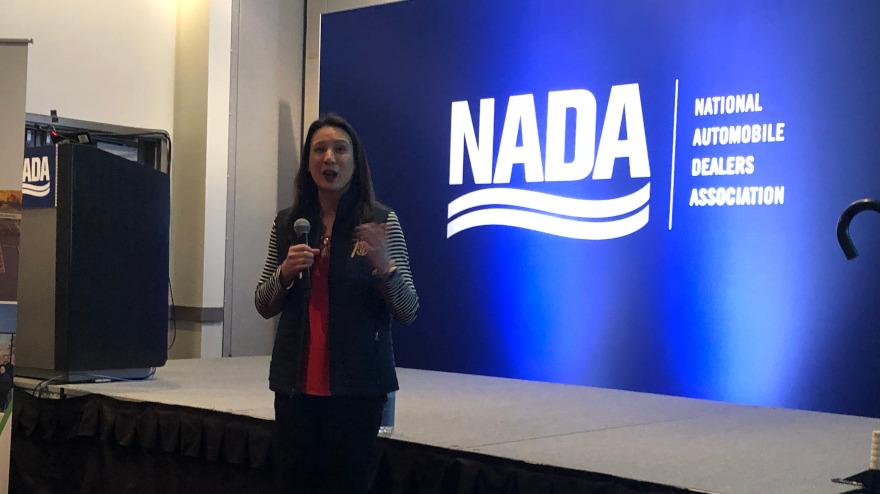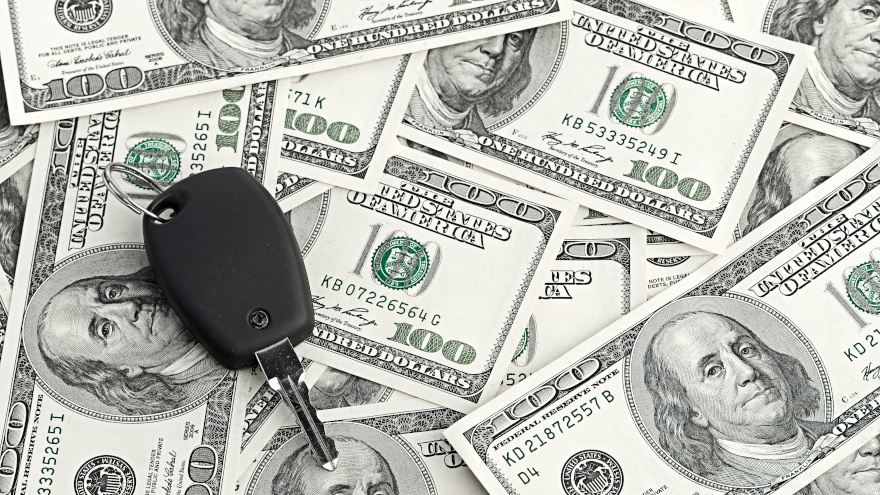The impact of the COVID-19 to the auto industry is complex, widespread and trickle-down in nature, impacting everything from manufacturing and supply chains to retail/wholesale sales and ancillary services.
Scot Wingo, co-founder and CEO of Spiffy, joined the Auto Remarketing Podcast on Tuesday to discuss how the panedmic has impacted his company's area of expertise: the mobile car care and the Fleet Management as a Service segments.
He also discussed the implications for ride-share food delivery and e-commerce delivery (like Amazon Prime trucks), where "supply chains are running at Cyber Monday levels right now."
Plus, Wingo explained how Spiffy is working with fleets to keep their drivers safe, both from a preventive vehicle maintenance perspective and through disinfecting cars, and he offers his insight on which areas of automotive innovation and technology could be most affected by COVID-19.
To listen to this episode, click on the link available below, or visit the Auto Remarketing Podcast page.
Download and subscribe to the Auto Remarketing Podcast on iTunes or on Google Play.
What will the impact of the COVID-19 pandemic ultimately have on used-car prices in 2020? That hinges on a number of factors.
Depending on which of two scenarios play out, used-car prices could decline about 10% in coming months and then recover in the fourth quarter or fall by as much as 15% before starting a recovery towards the end of the year.
That’s according to RVI Group, which has released a detailed analysis of the pandemic’s potential impacts on the general economy, new- and used-vehicle markets, ride-sharing services and more in its RVI Pandemic Outlook report.
The company outlines two scenarios in that report: The “Base Scenario” has the pandemic peaking in April before slowly drawing back in North America during the third quarter. This scenario also has a vaccine of sorts available by the end of the second quarter, with the pandemic ending by the close of 2020.
Meanwhile, the “Extended Pandemic Scenario” has it peaking at the end of the year instead of April, and then receding slowly next year in North America. That scenario doesn’t have a vaccine until 2021 and pinpoints the end of the pandemic as the end of next year.
Here’s how RVI sees the used-car market’s impact playing out for each of these scenarios, starting with the Base Scenario.
In this scenario, RVI doesn’t envision the used-car market having as much of an impact as the new-car market, given its relative inelasticity. What’s more, consumers often shift to used cars from new when the economy is challenging.
That said, used-car supply and demand are likely to be hit. Consumers aren’t shopping at stores, so demand is slowing, thus reducing demand for dealers to purchase cars wholesale. All told, this scenario would result in used prices falling 10% in the coming months before recovering in Q4.
“With the COVID-19 outbreak, the majority of auction activities have shifted to online platforms rather than physical auctions,” RVI said in the report.
“But even with this shift, auction activity is expected to slow down in the short term; dealers do not need to replenish their used inventory,” the company added.
“Since consumers are practicing social distancing and avoiding shopping in dealerships, sales are slowing. In addition, we expect the overall used-vehicle supply to decrease as trade-in and off-lease vehicle volumes will be lower.”
Should the “Extended Pandemic Scenario” happen, the impact on used-vehicle prices will be heightened.
“Used vehicle prices will decline by up to 15% over the remaining months of 2020 as demand for even used vehicles wanes,” RVI said. “Prices will start to recover towards the end of 2020 in the U.S.”
This scenario would also “severely” impact the new-car market, with at least six months of “extremely” low supply and demand. The annual sales rates for new cars would be 9.0 million in Q2 and Q3, with full year at 12.0 million. The full impact from both scenarios on the new-car market and beyond can be found in the report.
Over at J.D Power Valuation Services, analysts noted in a report Monday that through two months of 2020, used prices were up 3% year-over-year, following average annual gains of 2% the prior two years.
J.D. Power had projected before the pandemic that used prices for 2020 would be somewhere between flat with a year ago to up 1%. Given the impact of the pandemic, J.D. Power now has prices falling between 2% and 10%, based on three different scenarios: Low (down 2%), medium (down 8%) and high (down 10%).
Each of these scenarios reflect different disruptions to supply and demand.
“Each scenario is based on effects of employment, oil prices and household net worth/expectations of future income,” the company said in its report.
“The low-impact scenario assumes a relatively quick recovery following a sharp economic downturn in Q2 ’20, while the high-impact scenario assumes a much longer recovery well into 2021 following a deep recession and very gradual improvement in employment,” it added. “The medium-impact scenario assumes a brief recession near-term followed by a recovery later in 2020 and into 2021.”
With the spread of COVID-19, General Motors says it has sought to use its talents and resources to help in the shared fight against the pandemic.
The pandemic created a shortage of face masks, and GM on March 20 launched what it described as a “rapid-response project” to produce masks at scale to help protect workers in essential services across the country.
“Working around the clock, our team rallied with incredible passion and focus to come up with a plan to produce masks that will help protect the women and men on the front lines of this crisis.” said GM vice president, global manufacturing engineering, Peter Thom, in a news release.
GM says it launched a rapid-response project on March 20 to produce masks at scale.
Seven days later, the team produced its first sample on the new production line.
On Tuesday, GM said that it expects to deliver its first 20,000 masks to frontline workers by next week.
The company said that the project would have taken several months to plan and execute without help from its partners around the globe. GM said the team working on the face-mask project accomplished the task in just one week.
GM asked more than 30 engineers, designers, buyers and members of the manufacturing team to help with product development, sourcing materials and equipment, and planning the production process.
The company first called those who work with fabric vehicle components, said Karsten Garbe, who is GM plant director, global pre-production operations.
“In a few days, the company’s seat belt and interior trim experts became experts in manufacturing face masks,” Garbe said in a news release.
The team used its existing supply chain to source the necessary raw materials. Those materials include metal nose pieces, elastic straps and blown, non-woven fabric filter material.
To design and build the custom machinery needed to assemble the masks, GM collaborated with JR Automation in Holland, Mich. and Esys Automation in Auburn Hills.
For the project, the team chose the ISO Class 8-equivalent cleanroom at GM’s manufacturing plant in Warren. Crews installed new electrical service lines to power the production equipment and assembly stations.
Crews installed equipment and staged the production line, testing each step in the production process and looking for opportunities to improve quality and production speed.
The project team had its first production-made mask on Friday.
“Not only did the team make their goal, but they over-delivered,” Thom said.
Thom added, “They actually beat our deadline, running the first mask through the equipment 30 minutes ahead of target. We’re excited because this means we’re even closer to being able to protect the healthcare teams who are working tirelessly to save lives.”
Teams working through the weekend produced more than 2,000 masks by Monday.
These initial test samples will be used to ensure the quality standards are met. After completion of those quality measures, the team could begin producing masks for delivery early next week.
To staff mask operations, GM and the UAW will seek more than two dozen paid volunteers from Detroit-area plants. GM has implemented safety measures to protect those team members, including physical distancing, enhanced on-site cleaning and pre-entry health screening.
The team expects to have 20,000 masks ready for delivery on April 8.
GM says it will be able to produce up to 50,000 masks every day — or up to 1.5 million masks a month — once the line is running at full speed.
The company is planning distribution of the masks, and those plans include use of safety equipment to protect employees.
GM has posted information on its efforts to combat the COVID-19 outbreak at https://www.gm.com/coronavirus.html.
Black Book generated a wide-ranging update as both the wholesale and retail segments grind to nearly a halt in many places because of the coronavirus pandemic.
Analysts also offered both short-term and long-term projects about when activities and values might rebound, depending on severity of a recession.
Black Book began by noting that Manheim was still hosting digital sales last week, but the company was not allowing sellers to physically represent their vehicles on the block, nor were buyers allowed to come to facilities to physically inspect inventory
Black Book added that many independent auctions shifted to virtual sales, too.
“Unfortunately, we received reports that some of the traditional dealers that are accustomed to in-person buying struggled to learn the new way of virtually purchasing so quickly,” Black Book analysts said in their wide-ranging update.
After KAR Global previously took similar actions, Black Book mentioned by the middle of last week analysts received notice that America’s Auto Auction suspended operations at all locations, as well.
“Sale rates across auctions were very low and not what we would traditionally be seeing for this time of year,” Black Book analysts said. “Typically, this is a strong time for values and sales percentages.
“This past week was a continuation of the trend we started to see at the end of the week prior — increased no-sales and low values on the units that did manage to sell,” analysts continued. “We have been talking to remarketers, and most are preparing to ‘ride it out’ and don’t feel the need to lower their floors to move the inventory right now.
“Dealer sentiments have also been of the ‘wait-and-see’ mentality,” Black Book went on to say.
Immediate impact on values
Through its regular installment of Market Insight report, Black Book offered its latest data of what COVID-19 did to wholesale values.
“As more stay-at-home orders go into effect and dealership sales departments are required to close, the buying activity on the lanes has decreased and so have the prices," said Laura Wehunt, Black Book’s vice president of automotive valuations.
According to their volume-weighted data, analysts determined overall car segment values decreased by 1.04% this past week.
“This is in stark contrast to the low depreciations and in some cases increases we had been experiencing the last couple of months,” analysts said in the Market Insight report.
“In cars, there were no surprises based on what has been on the news and the observations on the auction lanes; all segments experienced significant declines this past week,” they continued.
On the truck side, Black Book found values didn’t soften quite as much.
Volume-weighted information showed overall truck segment values — including pickups, SUVs and vans — values decreased by 0.36% last week.
“Like with cars, the segment adjustments were not a shock after the sentiments we heard all week from the virtual auction lanes as a result of COVID-19,” analysts said.
Black Book also instructed its representatives to gather observations from the online sales that still unfolded. Here are the anecdotes that originated from the virtual lanes:
— From New Jersey: “Right from the start, no sales were abundant.”
— From Texas: “Almost everything was as-is with high mileage. Majority of the vehicles were no-sales or ifs.”
— From Georgia: “Nothing sold!”
— From Florida: “Seller had roughly a 20% sales rate.”
— From Oregon: “They were selling very few vehicles. Prices were down and a few ifs. Even the ‘under $1,000’ vehicles struggled to sell.”
Wholesale price forecasts
Black Book analysts broke down its wholesale price forecast into two parts, beginning with the impact under their most likely scenario, followed by one considering a severe recession.
In the short-term outlook — the next three to nine months, the components of the forecast of the most likely scenario included:
— An overall 13% drop in wholesale prices for 1- to 6-year-old vehicles compared to the baseline seen before the coronavirus pandemic started.
— An overall 14% decline for SUVs and light trucks and 10% decrease for cars.
“There is a high probability that older, cheaper vehicles in good condition will not decline as much due to increased demand on those units,” analysts said.
Black Book then delved into its longer-term projections for 36-month residual values under the most likely scenario.
“The effect of the pandemic will be felt, but we project that values will return to the pre-virus baseline as used supply will shrink due to cuts in production in 2020 and 2021,” analysts said.
Black Book then moved on to its wholesale prices impact under a severe recession scenario.
Again, in the short-term outlook — the next three to nine months, the components of the forecast of the severe scenario included:
— An overall 22% drop in wholesale prices for 1- to 6-year-old vehicles compared to the baseline seen before the coronavirus pandemic started.
— An overall 25% decline for SUVs and light trucks and 15% decrease for cars.
Ally Financial is continuing to expand its commitments to online-only vehicle retailers as the coronavirus pandemic cripples the economy.
On Monday, Vroom announced a $450 million inventory financing relationship with Ally Financial, broadening the floorplan financing it has provided to Vroom since 2016.
Executives said the new agreement — finalized earlier this month — doubles the total amount of available credit and is Ally’s first fully committed facility to Vroom.
“We’re thrilled to be broadening our financing relationship with Ally, so we can expand our offering of thousands of high-quality, affordable vehicles with delivery straight to customers,” Vroom chief executive officer Paul Hennessy said in a news release.
“Car buyers and sellers are turning to ecommerce solutions more than ever, especially right now, and Vroom is well-positioned as we deliver a seamless online experience,” Hennessy continued.
The expanded relationship with Vroom came on the heels of Ally pledging up to $2 billion to help Carvana originations.
“Ally takes great pride in using our extensive auto experience to find solutions that help support our dealer customers, particularly during this difficult time confronting the country and the auto industry,” said Doug Timmerman, president of auto finance for Ally.
“We’re excited to expand our financing relationship with Vroom to continue supporting the innovative e-commerce company’s inventory acquisition efforts and national growth strategy,” Timmerman continued.
Late on Monday, crucial updates from the U.S. Department of the Treasury and the Internal Revenue Service arrived about programs aimed to help both businesses and individuals through the Coronavirus Aid, Relief, and Economic Security (CARES) Act.
Furthermore, the U.S. Chamber of Commerce created a guide to help small businesses, independent contractors and gig economy workers prepare to file for a coronavirus relief loan under the CARES Act.
The updates began with the Treasury Department, which published the following resources to assist eligible businesses in applying for payroll support to enable the continued payment of employee wages, salaries and benefits, and for loans pursuant to the CARES Act:
— Guidelines and application procedures for payroll support to air carriers and contractors under Division A, Title IV, Subtitle B of the CARES Act can be downloaded here.
— Procedures and minimum requirements for loans to air carriers and eligible businesses and national security businesses under Division A, Title IV, Subtitle A of the CARES Act can be downloaded here.
The U.S. Chamber recapped that last week Congress passed the CARES Act, which allocated $350 billion to help small businesses keep workers employed amid the pandemic and economic downturn. Known as the Paycheck Protection Program, the initiative provides 100% federally guaranteed loans to small businesses that maintain their payroll during this emergency.
Furthermore, the Chamber pointed out these loans may be forgiven if borrowers maintain their payroll during the crisis.
Earlier on Monday, the National Automobile Dealers Association launched an initiative to help local dealerships navigate business and regulations in the coronavirus environment will provide information about coronavirus developments affecting dealership operations.
Also, the National Independent Automobile Dealers Association, in partnership with CliftonLarsonAllen, is hosting a special, free webinar titled, “The CARES Act and its Impact on the Independent Dealer.” The session is set for 2 p.m. ET on Wednesday.
The Treasury Department said it will continue to provide guidance and updates on program implementation under the CARES Act online at www.Treasury.gov/cares.
IRS answers several pressing questions
Also late on Monday, the IRS announced that distribution of economic impact payments will begin in the next three weeks and will be distributed automatically, with no action required for most people.
However, officials said some seniors and others who typically do not file returns will need to submit a simple tax return to receive the stimulus payment.
The IRS went on to answer some of the most pressing questions individuals might have about assistance, including:
Who is eligible for the economic impact payment?
Tax filers with adjusted gross income up to $75,000 for individuals and up to $150,000 for married couples filing joint returns will receive the full payment. For filers with income above those amounts, the payment amount is reduced by $5 for each $100 above the $75,000/$150,000 thresholds. Single filers with income exceeding $99,000 and $198,000 for joint filers with no children are not eligible.
Eligible taxpayers who filed tax returns for either 2019 or 2018 will automatically receive an economic impact payment of up to $1,200 for individuals or $2,400 for married couples. Parents also receive $500 for each qualifying child.
How will the IRS know where to send my payment?
The vast majority of people do not need to take any action. The IRS will calculate and automatically send the economic impact payment to those eligible.
For people who have already filed their 2019 tax returns, the IRS will use this information to calculate the payment amount. For those who have not yet filed their return for 2019, the IRS will use information from their 2018 tax filing to calculate the payment. The economic impact payment will be deposited directly into the same banking account reflected on the return filed.
The IRS does not have my direct deposit information. What can I do?
In the coming weeks, Treasury plans to develop a web-based portal for individuals to provide their banking information to the IRS online, so that individuals can receive payments immediately as opposed to checks in the mail.
I am not typically required to file a tax return. Can I still receive my payment?
Yes. People who typically do not file a tax return will need to file a simple tax return to receive an economic impact payment. Low-income taxpayers, senior citizens, Social Security recipients, some veterans and individuals with disabilities who are otherwise not required to file a tax return will not owe tax.
How can I file the tax return needed to receive my economic impact payment?
IRS.gov/coronavirus will soon provide information instructing people in these groups on how to file a 2019 tax return with simple, but necessary, information including their filing status, number of dependents and direct deposit bank account information.
I have not filed my tax return for 2018 or 2019. Can I still receive an economic impact payment?
Yes. The IRS urges anyone with a tax filing obligation who has not yet filed a tax return for 2018 or 2019 to file as soon as they can to receive an economic impact payment. Taxpayers should include direct deposit banking information on the return.
I need to file a tax return. How long are the economic impact payments available?
For those concerned about visiting a tax professional or local community organization in person to get help with a tax return, these economic impact payments will be available throughout the rest of 2020.
Where can I get more information?
The IRS will post all key information on IRS.gov/coronavirus as soon as it becomes available.
“The IRS has a reduced staff in many of its offices but remains committed to helping eligible individuals receive their payments expeditiously,” agency officials added. “Check for updated information on IRS.gov/coronavirus rather than calling IRS assistors who are helping process 2019 returns.”
Assistance from the U.S. Chamber
The U.S. Chamber of Commerce shared information to help small businesses like dealerships navigate the challenges connected with getting federal assistance.
The U.S. Chamber’s Coronavirus Small Business Guide — available at uschamber.com/sbloans — outlines the steps small businesses should take now and prepare to access much-needed funds to help keep their workers on the payroll during this disruptive period.
Chamber officials stressed that further guides will be developed as the CARES Act becomes implemented.
“The U.S. Chamber of Commerce is working with state and local chambers across the country to provide businesses with the information they need to stay afloat and keep people employed during the pandemic,” U.S. Chamber of Commerce president Suzanne Clark said in a news release.
“This comprehensive guide ensures small business owners fully understand what aid is available to them and how to access those funds as quickly as possible,” Clark continued. “We remain committed to ensuring no family or business goes bankrupt due to financial hardships associated with the coronavirus.”
Additionally, to help small businesses, the U.S. Chamber of Commerce highlighted that it has compiled an interactive map to show the aid available to them on a state-by-state basis. That information is available here.
In a letter to President Donald Trump last week, National Auto Auction Association chief executive officer Frank Hackett voiced his support of efforts made by franchised and independent car dealers, who are asking the president for clarification that sales and leasing at their stores is an essential service.
Hackett also emphasized the importance that auto auctions play in both the auto industry and the nation’s overall economic health.
“On behalf of the National Auto Auction Association (NAAA), I am writing in strong support of the letters written to you by the National Automobile Dealers Association and the National Independent Automobile Association requesting clarification that automobile sales and leasing at automobile dealers be deemed an essential service permissible during the pandemic,” Hackett wrote.
On Tuesday of last week, the leaders of the National Automobile Dealers Association (NADA), the American Truck Dealers (ATD), the National Association of Minority Automobile Dealers (NAMAD), the American International Automobile Dealers Association (AIADA) and the Alliance for Automotive Innovation sent a letter to Trump asking for clarification that vehicle sales are essential services that need to be maintained during the COVID-19 pandemic.
Likewise, NIADA on Tuesday also delivered a letter to the White House so stores not connected with an automaker can remain open, too.
In his letter to Trump, NIADA CEO Steve Jordan requested clarification from the administration that automobile sales and leasing at independent dealerships are essential services permissible during the COVID-19 pandemic, and asked that the recent guidance document on the essential critical infrastructure workforce issued by the Department of Homeland Security and the Cybersecurity and Infrastructure Security Agency be amended to include vehicle sales and leasing as essential services.
Auctions play key role
After providing information on the scope of the auto auction industry in his letter, Hackett laid out the critical role auctions play in the automotive ecosystem.
“Auctions are a key economic driver and an integral player of the auto industry. They play a major role as a wholesale market for second-hand vehicles. Many
automobiles sold have gone through the auction process,” Hackett explained.
“Without the viable sale of automobiles, especially during the current pandemic when buyers in need of an automobile tend to focus on second-hand vehicles given the cost concerns, the auction process and its industry would come to a grinding halt,” he said. “As a result, many automobiles that would have been available to consumers won’t be.”
The full letter can be found here.
Auction update
As he has done the past few Mondays, Hackett held a teleconference with auction industry leaders and provided Auto Remarketing with an update.
Most auctions at this point are running simulcast, he said. Very few are running brick-and-mortar sales.
“Most everybody is running simulcast,” Hackett said.
He didn’t have an exact number of auctions still running brick-and-mortar, but estimated at “a handful” and said it’s likely in areas that aren’t “hot spots” for the pandemic.
“That number is dwindling, but they're practicing social distancing and all the precautions. But they're really toning it down,” Hackett said.
He declined to provide specifics, but Hackett did note that furloughs started to occur in the auction industry and there seemed to be an uptick in the past week.
Sante Esposito, a lobbyist for NAAA, joined the call again and discussed legal updates and provided details on loans and stimulus packages.
Nick Zulovich contributed to this report.
Through a post on its website that began with, “It is with heavy hearts,” the Ken Garff Automotive Group announced chairman Robert Garff has passed away due to complications from COVID-19.
“After driving back from a visit to Palm Springs, Robert and his wife, Katharine, were tested and confirmed positive for COVID-19, at which time they immediately self-quarantined,” the dealer group wrote in the post that appeared over the weekend.
“Earlier this week, Robert felt more ill and was admitted to the hospital. Katharine continues to recover at home,” the group continued.
“Robert was a giant in the community, a pioneer in the auto industry and the biggest cheerleader to every employee at Ken Garff Automotive. Robert loved his family immensely and will be missed by them as well as his employees and many friends,” the group went on to say.
Ken Garff Automotive offers 26 brands of new and used vehicles in 51 dealerships that comprise 89 franchises. The group has locations in six states with concentrations of stores in the West and Midwest regions of the United States.
The group also shared a brief bio:
Robert loved continuing the Garff family legacy of being involved in and giving back to the community in as many ways as possible. He was very committed to education, founding the Keys to Success program to encourage Utah students to focus on education and build their futures. Furthermore, he proudly supported his alma mater, the University of Utah, helping fund a new building for the David Eccles School of Business, and the upcoming Ken Garff Performance Zone at Rice-Eccles Stadium.
He held multiple community positions, including former Chairman of the Board for the Deseret Book Company and board member for organizations such as Intermountain Healthcare, the Salt Lake Convention and Visitors Bureau, and the Utah Commission on Volunteers. He also served as the chairman of the board of trustees of the Salt Lake Organizing Committee for the 2002 Olympic Winter Games.
Robert also held various leadership positions during his career, including Speaker of the House of Representatives for the state of Utah, former board member of First Security Bank and former chairman of the Salt Lake Chamber of Commerce. Robert also served in many positions for the American Cancer Society.
Unsurprisingly, Robert also received multiple honors for his work, both in business and the community. Notable honors included Dealer of the Year from the American International Automobile Association, the Distinguished Utahn Award from the Salt Lake Chapter of the BYU Management Society, and most recently, the University of Utah’s David Eccles School of Business inducted Robert into their prestigious Business Hall of Fame.
In an update from president Grace Huang, Manheim said Friday it will “extend our current auction operations, as local, state and national directives allow,” continuing to hold Simulcast-only sales at locations as allowed by such directives.
All Manheim auctions remain closed to buyers and sellers on sale and non-sale days; the only visits allowed are for vehicle pickup and drop-off.
Sellers are not permitted to rep vehicles at auctions. Selling must be done through the Remote-Seller tool.
Payments and arbitration will be handled through “alternative means.”
Manheim continues to waive buyer and seller fees on Simulcast, and the company will keep its digital avenues OVE, Manheim Express and Private Stores open.
“The health and safety of our team members, clients and communities has always been our top priority. At the same time, as an industry leader that plays a critical role in the automotive supply chain, our goal has also been to help our clients keep their businesses moving forward,” Huang said in the update.
“After thoughtful consideration and with our objectives in mind, we have made the decision to extend our current auction operations, as local, state and national directives allow,” she said. “We will continue to closely monitor changing conditions and be prepared to address COVID-19 developments as they arise.”
Huang later added: “I remain incredibly inspired by the resilience of our team members and the loyalty of our clients as we work together during these unprecedented times. Let’s do all we can to continue to support each other as we push through this extraordinary challenge together.”
Automakers and their captive finance companies rolled out generous offers to keep new-vehicle deliveries going during the coronavirus pandemic; efforts such as 0% annual percentage rates for 84 months for well-qualified buyers.
Perhaps, not quite to that generous level, some captives and other finance companies launched efforts to help used-vehicle financing, too, especially for certified pre-owned models.
“During an economic slowdown, there is a natural shift towards used-vehicle demand. But savvy captive lenders (like Nissan and Acura) are sweetening the deal even further with deferred payments and CPO financing deals on par with new-vehicle offerings," said Eric Lyman, chief industry analyst at ALG and TrueCar.
“Emphasizing used-vehicle incentives now, early on in this downturn cycle, will pay dividends down the road,” Lyman continued in a message to Auto Remarketing. “This will build momentum for CPO sales, supporting faster turn rate of higher profit-per-unit used sales for dealers and reaching out to consumers who could establish longer-term relationships as loyal customers once economic conditions improve.
With perhaps Acura and Nissan taking the lead, here is a rundown of used-vehicle financing special programs shared so far with Cherokee Media Group:
Acura and Honda
Existing Acura and Honda Financial Services (AFS/HFS) account holders can secure payment extensions and deferrals of up to 60 days, as well as late fee waivers to those impacted by COVID-19
The captives also are rolling out certified pre-owned special APRs for the Acura TLX and RDX from April 1 to June 1 as well as the Honda Civic, Accord and CR-V from April 17 until June 1.
And for dealers, the automaker is also offered a 40% reduction in CPO fees through April 30.
Ally Financial
The company is offering 90 days of payment deferment for new customers who acquire a used vehicle. Ally is also offering free, 30-day lease extensions for customers whose leases are maturing in March and April.
Hyundai
Hyundai will make up to six months of payments for vehicle owners who lose their jobs and have purchased or leased their vehicle between March 14 to April 30 through Hyundai Motor Finance.
Lexus and Toyota
Toyota Financial Services and Lexus Financial Services are offering 90-day payment deferrals to customers who purchase a certified pre-owned Toyota or Lexus vehicle.
Nissan
Nissan Motor Acceptance Corp. (NMAC) will offer 90-day deferred payments and terms up to 72 months for CPO customers.
Truist Financial
The merged commercial banks have multiple offerings for used-vehicle financing.
Its BB&T Dealer Financial Services and SunTrust Dealer Financial Services programs include delayed first payments of up to 90 days on used vehicles.
Furthermore, its SunTrust Dealer Financial Services as well as programs through the Truist Financial brand now include 84-month terms on used-vehicle financing for the 2018 to current model years. Both programs are subject to the published program guidelines and qualifications.
While this list currently does not include all OEMs and finance companies, Edmunds executive director of insights Jessica Caldwell isn’t expecting a wide-ranging effort for used-vehicle financing like companies have pushed and promoted to get new metal going.
“Auto companies are up against so many other issues right now that it’s unlikely that they’re going to be focusing much on used vehicle financing,” Caldwell said in a message to Auto Remarketing.
Cox Automotive chief economist Jonathan Smoke is taking a cautious approach, too, when considering financing and retailing for both used and new vehicles in the near term.
“We could see a rebound in the second half of the year depending on what happens with the virus and the economic response,” Smoke said in a video posted on March 24.
“Given the negative trends we’ve seen in connection with the virus, we continue to see negative trends in terms of demand. The (Federal Reserve) is doing whatever it takes to keep the financial markets functioning to keep the economy from seeing even worse outcomes,” Smoke added.

